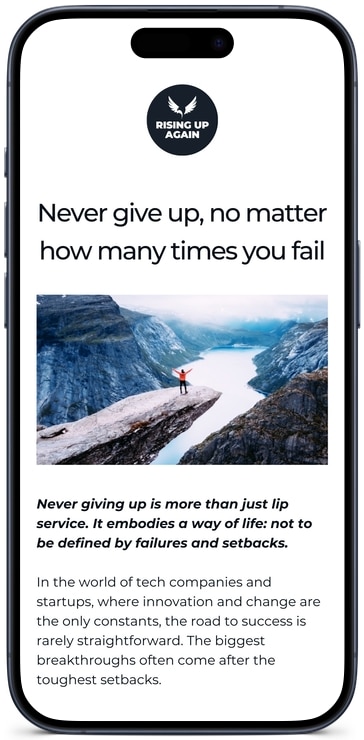Can our perception blind us? Sometimes it seems so. It is not uncommon for us to see things from our very own perspective. There is no guarantee that we are correct.
Looking back, I can think of a few moments when I corrected my first impression of something or a situation in hindsight — in both a positive and negative direction. This was and is usually triggered by conversations with other people and an interest in hearing and understanding their perspective on the same thing or situation.
I had another conversation like this a few weeks ago. I got the chance to exchange ideas with a chief inspector of the police. We spoke to each other for a good 1 ½ hours. He shared his experiences from more than 35 years of service with me — anonymously, of course, and without revealing any details. We talked a lot more about life as such.
Our exchange brought many exciting aspects to light. A realization inspired me to write this article. Let’s delve a little deeper into the subject of subjective perception below.
What subjective perception means
Our perception is in principle selective and subjective. Put simply, this means nothing else, that we humans perceive the things that seem important to us. On the other hand, perception is also subject to our subjective interpretation, i.e. our very individual imprints and experiences.
An example: As a child, I had a negative experience with a dog. The reason for this was that I was unfortunately too hectic with it. When it got startled, it grabbed my arm. This in turn gave me a great fright.
This simple situation can lead to the subjective perception that, as a result of this experience, caution is required when dealing with dogs — even the prejudice that dogs are fundamentally dangerous and want to bite.
“It is certainly no secret that prejudice and pigeonholing are more of a hindrance than a help in life.”
From subjective to objective perception
Let’s mentally jump back to my exchange with the Chief Inspector. Certainly, he has experienced a tricky situation more than once in his more than 35 years of service. For example, imagine the moment when two people suddenly attack each other. Ask yourself how important it is for a police officer in this situation to have an unprejudiced perception in order to settle the dispute and investigate it objectively.
Or think of your professional environment: for example, a manager whose view of individual employees may be clouded because subjective perception creates prejudices that even let the actual performance of the employee recede into the background.
Or what we more or less all know from our private environment when we are newly in love: it is not uncommon for us to see the world through rose-colored glasses during the so-called infatuation phase and idealize the new partner. When this phase has passed, we take a sober view of the situation and may even be disappointed in the new partner.
With regard to the above examples, the question arises whether and how we can switch from a subjective to an objective perception.
Basically, I am of the opinion that perception will always remain subjective to a certain extent. Nevertheless, it is possible to look at a thing or situation from as objective a perspective as possible.
The first essential step is to sharpen your self-awareness. It is about constructively questioning how we perceive things and people around us, what right and wrong beliefs shape our behavior, and what effect the opinions of others have on us.
The following exercise can give you a new perspective in this context:
Take a person from your living environment. This can be a friend, acquaintance, colleague, or celebrity you know from TV. Once you have the person in mind, forget everything you know about this person and look at them completely neutrally, without prejudice or judgment.
Are you able to recognize completely new facets of this person?
Final thought
Our perception has a major impact on how we see a person, situation, or thing. Wrong, limited, and judgmental perception often enough misleads us in our life or profession. It is therefore important that we sharpen our perception again and again in order to break down prejudices and stop thinking in pigeonholes.
As mentioned at the beginning, I have discovered conversations with other people to get new perspectives and opinions and compare them with my perception and derive new perspectives from them. For example, the exchange with the police chief inspector opened up new perspectives for me.
No matter what your personal path looks like for you, it is worth taking it. Because it is often the new, unexpected and surprising experiences that actually enrich our lives.



